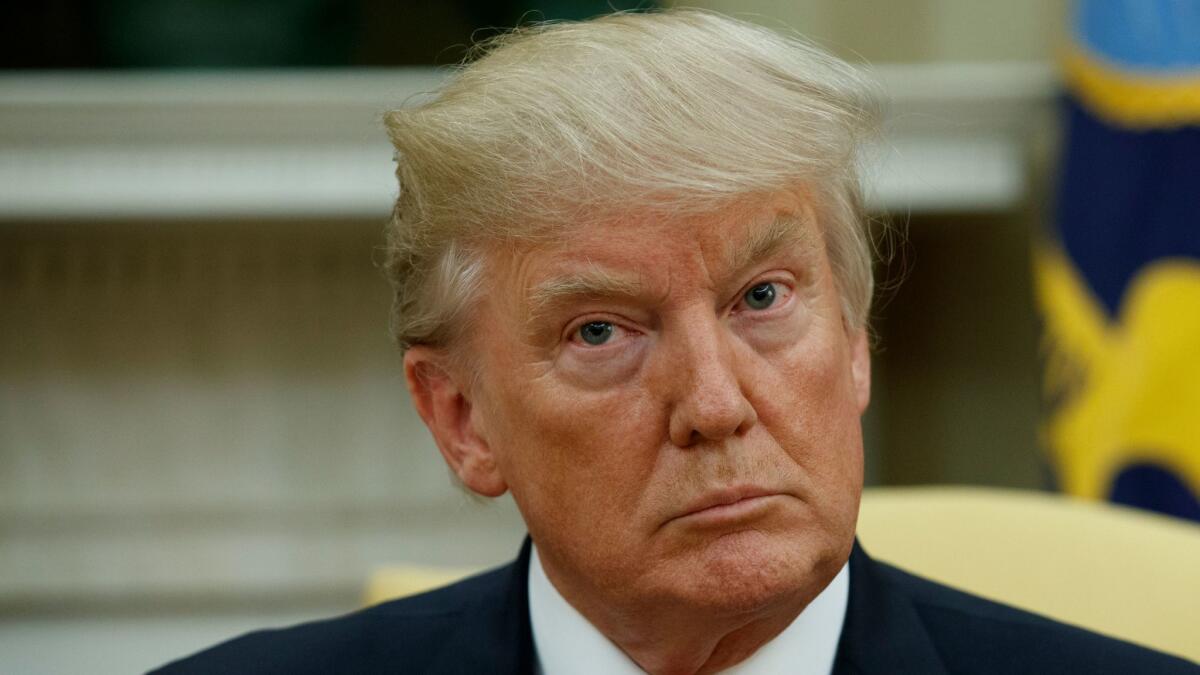Europe’s once-positive worldview of U.S. slips under Trump

- Share via
Reporting from Washington — Slightly more Europeans now view the United States unfavorably under President Donald Trump than favorably, according to a survey of public attitudes in three-dozen countries that comes as Trump prepares for a return visit to the continent early next month.
The Pew Research Center survey released Monday also found scant confidence outside the U.S. in Trump’s leadership on the world stage, with many opposing his plans to build a wall along the U.S-Mexico border and withdraw the United States from international climate change and trade agreements.
Trump likely would be heartened by the fact that a majority said they see him as a strong leader, but that positive view was outweighed by even larger majorities who view the real estate developer and former reality-TV star as arrogant, intolerant or dangerous.
Last year, a median of 61% held a favorable opinion of the U.S. across France, Germany, Poland, Spain and the United Kingdom, compared with 26% who held unfavorable views.
Since Trump, who has held office for five months, opinion in these countries was 46% positive to 52% negative. The change marked the first time since the final year of George W. Bush’s presidency in 2008 that the public in these European countries has expressed more unfavorable than favorable views of the U.S., the survey found.
Bush’s ratings fell after the U.S. invaded Iraq in 2003 and never fully recovered in some countries, where he was viewed as engaging in “cowboy diplomacy.”
The shift in European attitudes was disclosed less than two weeks before Trump visits Poland and Germany after the Fourth of July holiday to meet with U.S. allies and other leaders.
Trump’s first overseas trip as president last month took him to the Middle East, Belgium and Italy, where he lectured NATO allies about increasing their defense spending. He also disappointed European and other leaders by refusing to recommit to a landmark climate agreement that the U.S. and other nations had agreed to in 2015.
Trump announced shortly after returning to Washington that he was withdrawing the U.S. from the Paris climate pact.
The survey also found scant confidence outside the U.S. in Trump’s ability to lead on the world stage, with fewer than 3 in 10 respondents, or 22%, expressing confidence.
Pew has produced the survey annually since 2002, during Bush’s first term. Monday’s edition is the first conducted since Trump took office in January.
According to the survey, a median of 22% across all 37 countries surveyed expressed confidence that Trump will do the right thing when it comes to international affairs. That means that if the results from each country are ranked in order, 22% is the midpoint, with the percentage expressing confidence in Trump falling above or below that point in equal numbers of countries.
The 22% rating also marks a steep drop from the closing years of Barack Obama’s presidency, when a median of 64% expressed confidence in Obama’s global leadership.
The results are based on telephone and face-to-face interviews conducted among 40,447 respondents in 37 countries in all regions of the world between Feb. 16 and May 8.
The survey found widespread disapproval of some of Trump’s major policies. The promised U.S.-Mexico border wall is opposed by a median of 76% across all 37 countries, rising to 94% in Mexico.
More than 7 in 10 disagree with Trump’s proposals to pull the U.S. out of a landmark climate-change agreement and withdraw from multinational trade deals such as the Trans-Pacific Partnership. Trump has pulled the U.S. out of both agreements, although the survey was conducted before his June 2 announcement on exiting the Paris climate accord.
More than 60% disapprove of Trump’s proposal for a temporary ban on people entering the U.S. from six majority Muslim countries. More than half the respondents in four countries — Hungary, Israel, Poland and Russia — support the proposal. Opposition was strong in several largely Muslim countries, including Jordan, Lebanon and Senegal.
U.S. courts had blocked two versions of Trump’s travel ban, but he won a partial victory Monday when the U.S. Supreme Court said he could go forward with a limited version of the ban. The high court also agreed to hear arguments in the case in October. The ban applies to visitors from Iran, Libya, Somalia, Sudan, Syria and Yemen.
While 55% see Trump as a strong leader, larger majorities of those surveyed said they see him as arrogant, 75%; intolerant, 65%; and dangerous, 62%.
ALSO
Support for same-sex marriage has grown steadily since Supreme Court ruling
Wide gulf in attitudes, experiences separates people who own guns from those who don’t
Russian confidence in Putin remains strong, even as domestic problems persist
More to Read
Get the L.A. Times Politics newsletter
Deeply reported insights into legislation, politics and policy from Sacramento, Washington and beyond. In your inbox three times per week.
You may occasionally receive promotional content from the Los Angeles Times.










